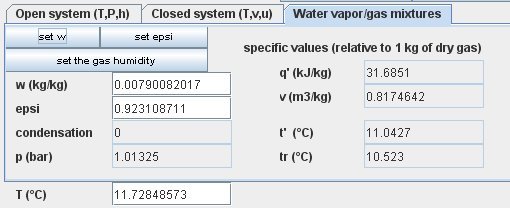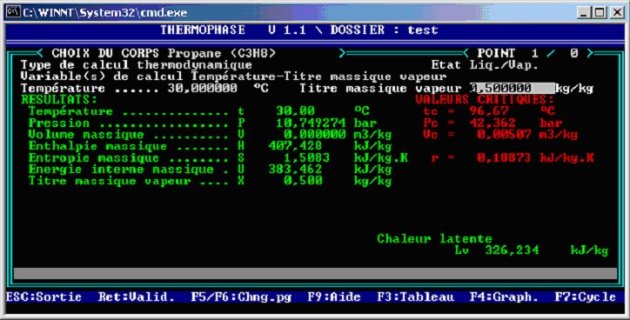Preset equations of state packages dedicated to certain classes of applications
Preset equations of state packages dedicated to certain classes of applications
When interested in a particular class of applications, it is often preferable to use a software package specifically developed for this purpose, in which the state equations have been shortlisted. Various software packages have been developed to calculate the properties of fluids used in refrigeration or steam.
Note :
Properties of pure substances
AllProps software
Thel AllProps software, developed by The Center for Applied Thermodynamics Studies, University of Idaho, Moscow, USA, allows one to calculate the properties of pure substances (enthalpy, entropy, specific heat, etc... ) for various categories of fluids (cryogenic, hydrocarbons, refrigerants...) in various units, with production of tables and graphs.
This figure shows the calculation and the plot by AllProps of the molar density of R134a at the pressure of 10 bar.
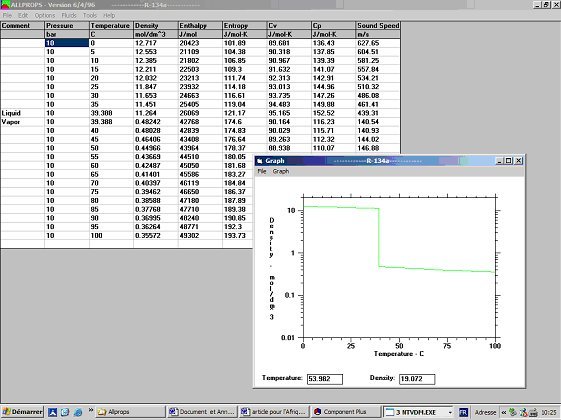
The Thermoptim software
Thermoptim is a very powerful energy systems modeling environment, which allows one to calculate the complete state of different fluids (temperature, pressure, mass volume, enthalpy, internal energy, entropy, exergy and quality), for ideal gases and condensable vapors.
These fluids can undergo various transformations or processes, such as the following included in the common core:
compression and expansion, in open or closed systems. These can be adiabatic or polytropic, and are characterized by their isentropic or polytropic efficiency;
combustion, also in a closed or open system, at set pressure, volume or temperature. Fuel can be introduced into the combustion chamber separately from the oxidizer, or premixed. The dissociation of the carbon dioxide can be taken into account;
isenthalpic throttling;
moist gas processes, dry gas and water mixtures (the latter covers seven different categories of processes);
heat exchanges with other fluids: the software is able to calculate the UA product or the overall heat transfer coefficient across the surface of a heat exchanger for the following configurations: counter flow, parallel flow, cross flow or (p-n) type.
In the demo version are available:
as pure vapors : water, ammonia, nitrogen, butane, methane, propane, R11 (CCl3F trichlorofluoromethane), R12 (CCl2F2 dichlorodifluoromethane), R13 (CClF3 chlorotrifluoromethane), R134a (C2H2F4, 1,1,1,2 tetrafluoroethane) and R22 (CHClF2 chlorodifluoromethane)
as pure ideal gases: Ar, CO, CO2, H2, H2O, H2S, He, N2, O2, SO2, SO3, CH4, C2H6, C3H8, C4H10
From the pure ideal gases, it is possible to calculate any gas compound.
The point screen presented below allows one to define a point and to calculate and display values taken by all its state functions. Three modes of presentation exist: by default for open systems, enterable values are pressure and enthalpy; on the other hand for closed systems, one enters the specific volume and internal energy; and finally for water vapor / gas mixtures. The choice of the substance is done by double-clicking in the field where its name appears.
Once a point defined and its properties calculated, it can be displayed in one of the interactive thermodynamic charts that have been mentioned above that are available in the package.
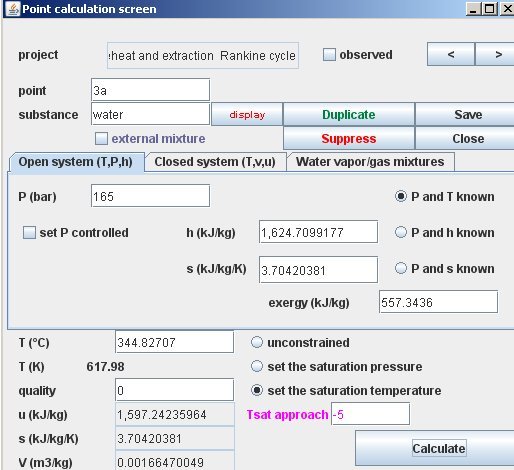
Calculator Inverter Thermoptim-Light
A page for calculating the thermodynamic properties of some ideal gases and vapors is at your disposal.
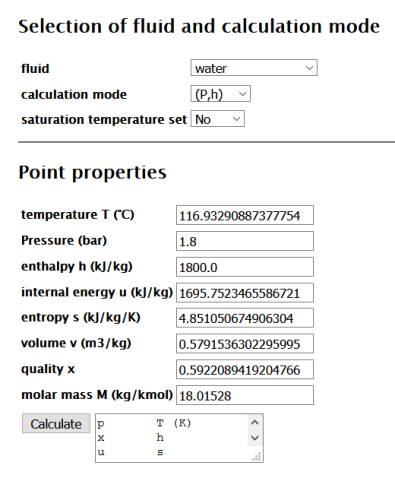
Thermophase software
Thermophase is developed at the Energy Centre of Mines ParisTech. It allows one, for different input variables, to calculate the thermodynamic and thermophysical properties of a large number of pure substances or azeotropic mixtures. It can be downloaded for free.
Water97_v13.xla macro
An example of a package using the new equations of water is the set of macros Water97_v13.xla for the Excel spreadsheet developed by Bernhard Spang Hamburg , which can be freely downloaded.
Water97_v13.xla is an Excel macro that provides a set of functions allowing one to calculate the thermodynamic and transport properties of water and steam using the IAPWS - IF97 standard. The available functions are used to calculate the following properties in the single-phase state for temperatures 273.15 K <T < 1073.15 K and pressures 0 <P < 1000 bar: density, specific internal energy, specific enthalpy, specific entropy, isobaric mass heat capacity, isochoric mass heat capacity, dynamic viscosity, thermal conductivity.
Other functions provide the boiling temperature as a function of pressure and the saturated vapor pressure as a function of temperature as well as the eight properties mentioned above for the saturated liquid and vapor state, the temperature ranging from 273.16 K to 647.096 K , and the pressure between 611.657 Pa and 220,64 bars .
Coolpack software
CoolPack includes six categories of simulation programs that can be used for designing, dimensioning, analyzing and optimizing refrigeration systems.
A description of CoolPack and several exercises can be found in the literature (in Danish and English). The software is free. It may be freely distributed, but it is required for all new users to register.
CoolPack comprises a calculator of properties for refrigerants (figure below), a very interesting calculator for heat transfer properties used in refrigeration (ethylene glycol, brines... ) , and a set of charts of different refrigerants
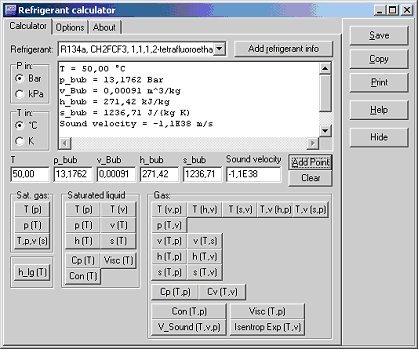
Note :
Properties of pure substances and mixtures
RefProp software
Refprop is a professional software package developed by NIST in the USA , which allows one to calculate with precision the thermodynamic properties of fluids used in refrigeration, including those new blends.
It allows one to generate tables of values and draw charts.
Here is the R 407C entropy chart, temperature glide fluid.
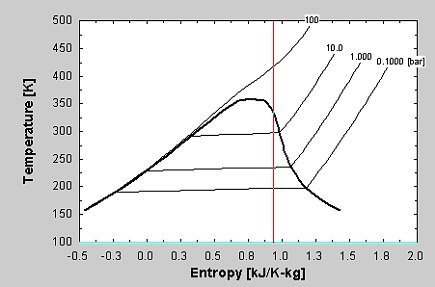
Thermoblend software
Thermoblend is developed at the Energy Centre of Mines ParisTech. It can:
calculate any property of a fluid on all domain (temperature, pressure, density, specific volume, entropy, enthalpy, specific heats, internal energy, composition of the different phases);
calculating and integrating properties of a fluid in a calculation code;
know the evolution of the properties of a mixture during a composition change.
All fluids (pure substances or mixtures ) commonly used are available in libraries. Any mixture of pure fluids can be made by the user. A demo version can be downloaded.
Here is the ammonia (h, log P ) chart established by Thermoblend.
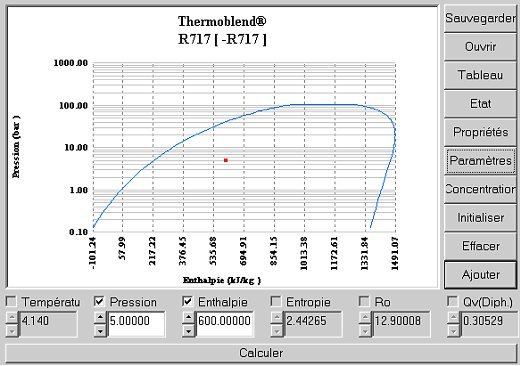
Solkane software
Solkane is a software package for calculating the thermophysical properties of fluids developed by the German company Solkane, which sells refrigerants. It can be downloaded for free.
It includes:
a standalone application to perform properties calculations for various refrigerants, as well as complete refrigeration cycle calculations, with the (T , S) and (h, log P) refrigerant charts, in which the cycles can be plotted
Dlls (Dynamic Link Libraries) for coupling Solkane to Windows applications;
macros to perform such calculations from an Excel spreadsheet
The displays are available in French, English and German, but only the German documentation is complete.
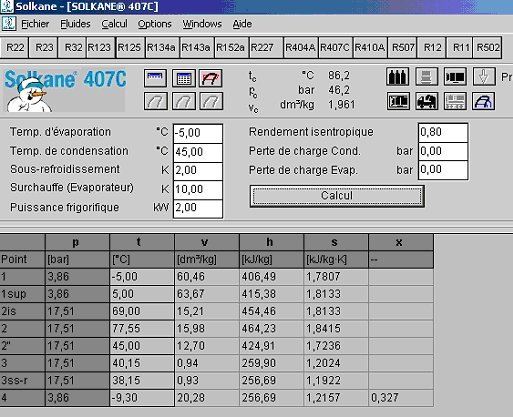
CalculAbs software
CalculAbs is a small free utility developed by Professor Pierre Neveu to calculate absorption cycles using the pair ( LiBr -H2O ).
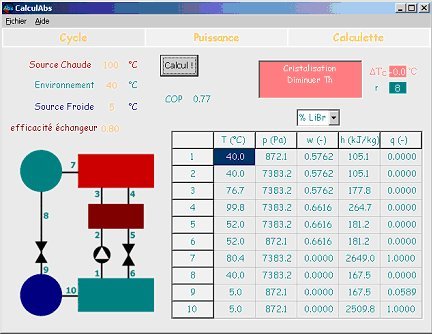
NH3-H2O software
NH3 -H2O is a free downloadable tool developed at the Energy Centre of Mines ParisTech. It allows one to calculate the thermodynamic state of the pair (ammonia water) used in absorption chillers.
It allows you to save a series of calculated points in a file
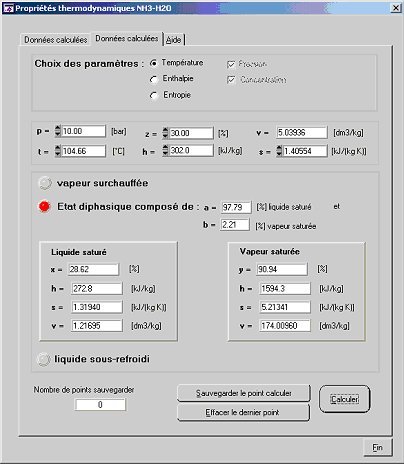
PsychroDream package for moist air
The software PsychroDream is developed by Francis Van Eeckhout. It can be downloaded for free
This is a psychrochart ("Carrier" chart of moist air) and calculation of moist air package, coupled with moist air calculation tools: mixing, cooling, humidification. It is intended for refrigeration technicians and generally to anyone having to deal with moist air.
The figure below shows the PsychroDream screen for calculating a point, the input data is the temperature and relative humidity.
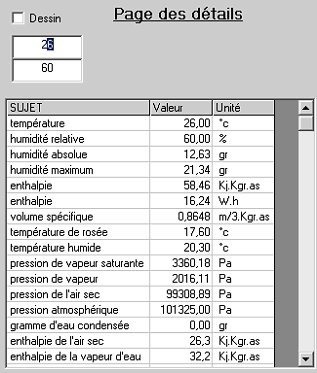
Remember also that Thermoptim allows one to calculate the moist properties of any dry gas, including of course air.
